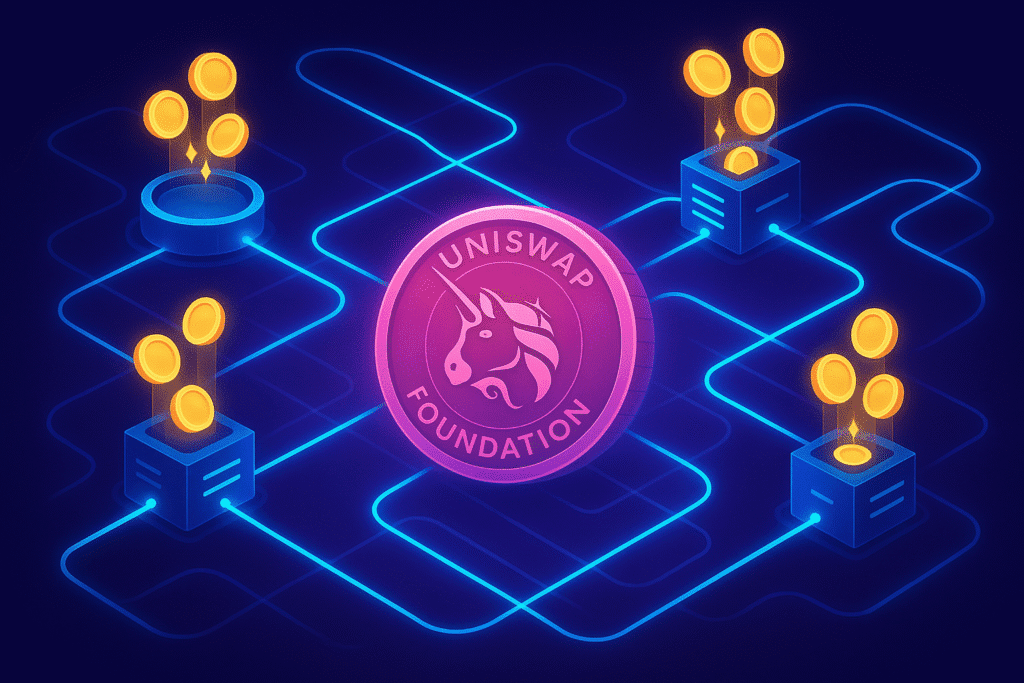Brevis develops a trustless rebate system for routers that integrates v4 hook pools. This initiative automatically verifies rebates without central supervision. The program aims to encourage adoption of Uniswap v4 by rewarding aggregators.
The Uniswap Foundation has awarded blockchain infrastructure company Brevis a significant grant in an effort to accelerate adoption of its recent upgrade, Uniswap 4.
According to today’s official blog, the Foundation plans to allocate up to $9 million to launch and administer the innovative Hook Routing Rebate Program.
The new initiative provides gas rebates for routers that have integrated v4 hooked pools.
Specifically, this grant aims to accelerate the adoption of version 4 of Uniswap.
The announcement indicated the following:
To accelerate the adoption of v4 hooks and make aggregator integration more beneficial, Uniswap awarded Brevis a grant to leverage ZK data coprocessors and zkVM to provide trustless gas rebates for routers that route order flow through v4 hooked pools.
🚀 @UniswapFND awarded Brevis a grant to build a trustless gas rebate program for v4 routers.
Up to $9 million in rebates for DEX aggregators who integrate v4 hook pools. All calculations are verified by Brevis ZK proof.
This is what we’re building 🧵 pic.twitter.com/7o4uLVPGCT
— Brevis (@brevis_zk) October 24, 2025
The decentralized trading protocol released its V4 update earlier this year, introducing advanced features such as hooks, modules that developers can use to personalize their liquidity pools.
Additionally, V4 launched a singleton infrastructure that merges pools under a single contract.
These upgrades introduced friendly fees, on-chain automation, and an enhanced experience for decentralized application (dApp) developers.
Additionally, v4 promised traders reduced slippage, lower fees, and more efficient trade execution.
The following was written on the blog on January 31st.
Beyond customizability, Uniswap v4 saves gas on both the swapper and LP. Creating a new pool in v4 is up to 99.99% cheaper than previous versions, and swappers can expect gas savings with multi-hop swaps.
Reward the aggregator after resource-intensive tasks
In addition to introducing new advancements, this upgrade has brought new challenges to decentralized aggregators such as Velora, 1inch, and 0X.
Decentralized aggregators are platforms that combine liquidity across different DEXs to find top trading routes.
Integration was easy in previous versions.
For example, Uniswap v2 adopted a constant product approach, but version 3 amplified complexity with concentrated liquidity and fee tiers.
Nevertheless, v3 still guarantees a consistent model.
Meanwhile, the long-awaited Uniswap version 4 now allows each pool to function independently based on the hooks it uses.
This allows Hook to introduce new execution ideas, apply special trading conditions and adjust fees.
This provides flexibility to facilitate integration.
However, everything has become demanding and complex, as aggregators must have a good understanding of how all personalized pools work before using them to route transactions.
That’s where a new rebate program by the Uniswap Foundation comes into play.
The initiative incentivizes routers that successfully integrate hook pools through interoperable protocols, offering up to $9 million in gas rebates.
Users automatically receive rewards based on their routing activity.
Meanwhile, these rebates can lower transaction fees, fund ecosystem development, and offset gas costs.
The team said:
These rebates provide new financial relief for trying v4 hooks on your router. Whether routers use them to offset their own operating costs, pass rebates on to traders as lower fees, or build sustainable treasuries, the result is the same. That means faster integration, deeper liquidity, and improved swap execution with lower fees for users.
Uniswap’s native token, UNI, is trading at $6.24 after gaining more than 1% in the past 24 hours.


